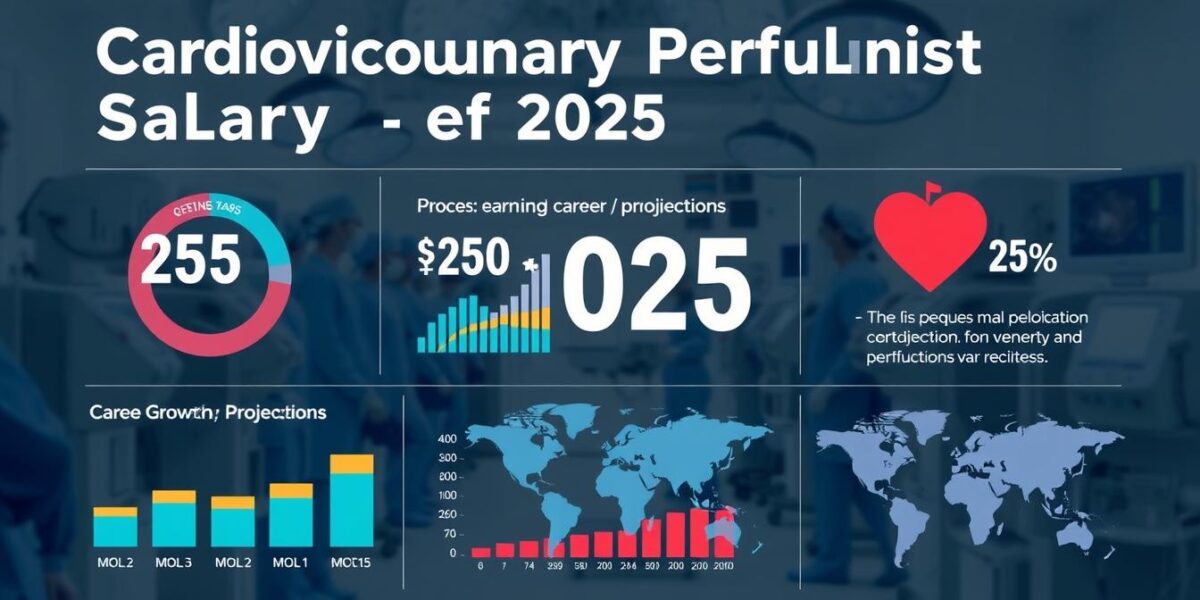Discover the average perfusionist salary and compensation trends in the US healthcare sector. Learn about job prospects, requirements, and ways to boost your earnings.
Did you know that perfusionists earn high salaries in healthcare? They make an average of $82 an hour in 2025. This job is key in saving lives during surgeries, offering great financial rewards for those who excel, let’s see perfusionist salary .
Perfusionists are vital in heart surgeries. They run machines that keep patients’ blood oxygen-rich. Their work is crucial for patient survival, making their salary a testament to their skill.
Thinking about a career in perfusion? It’s important to know about the salary. Starting out, you can earn up to $154,330 a year. As you gain experience, your salary can reach $184,881 annually.
Key Takeaways
- Average perfusionist salary reaches $169,781 in 2025
- Hourly rates range from $67 to $95
- Career offers strong financial potential in healthcare
- Specialized skills drive competitive compensation
- Opportunities exist across various medical settings
Understanding the Perfusionist Role and Career Path
Perfusionists are key in modern medicine, focusing on a unique and challenging field. They are crucial in complex surgeries, especially heart surgeries. Here, they manage medical technology with great care.
Perfusionists are medical experts who run heart-lung machines during surgeries. They make sure patients get the right blood and oxygen flow. This is vital when surgeons are doing delicate work.
Professional Responsibilities
- Manage heart-lung machines during cardiovascular surgeries
- Monitor patient’s physiological parameters
- Adjust medical equipment in real-time
- Collaborate with surgical teams
- Ensure patient safety during critical medical interventions
Educational Requirements
To be a perfusionist, you need a lot of education. Here’s what you’ll typically need:
- Bachelor’s degree in a science-related field
- Completion of an accredited perfusion technology program
- Professional certification as a Certified Clinical Perfusionist (CCP)
Essential Skills and Qualifications
Good perfusionists have both technical skills and people skills. Their salary shows how demanding this job is.
| Skill Category | Key Competencies |
|---|---|
| Technical Skills | Advanced medical equipment operation |
| Cognitive Skills | Critical thinking under pressure |
| Communication | Clear interaction with surgical teams |
“Perfusionists are the unsung heroes of complex surgical procedures, maintaining life-critical physiological balance during challenging medical interventions.”
Your success in this field depends on learning, being adaptable, and caring for patients. The salary for perfusionists varies based on experience, certification, and skills.
Current Perfusionist Salary Trends and Ranges
The perfusionist salary landscape is exciting for healthcare professionals. By 2025, salaries in perfusion technology are expected to grow. This means better pay for those in this field.
The average perfusionist makes about $169,781 a year. Salaries vary based on experience and area of focus. Here’s how salaries change with experience:
- Entry-level (Less than 1 year): $163,472
- Early Career (1-2 years): $173,110
- Mid-Level (2-4 years): $179,125
- Senior Level (5-8 years): $185,740
- Expert Level (8+ years): $186,212
There’s more to your salary than just your base pay. Special skills can increase your earnings:
| Skill | Salary Increase |
|---|---|
| Cardiopulmonary Perfusion | 14% raise |
| Commitment | 13% raise |
| Coordination | 10% raise |
“The perfusionist profession offers not just a career, but a pathway to substantial financial growth and professional development.” – Healthcare Compensation Review
Your salary as a perfusionist can change a lot based on where you work. Places like San Jose, CA, and Bridgeport, CT, pay especially well. You could make up to $213,075 a year there.
Geographic Variations in Perfusionist Compensation
Understanding the geographic landscape of cardiovascular perfusionist salary is key to making informed career decisions. Location greatly affects your earnings and job opportunities.
Highest-Paying States
The perfusionist technician salary varies a lot across different states. The top-paying regions are:
- California: Known for highest compensation rates
- New York: Substantial earning potential in metropolitan areas
- New Jersey: Competitive salaries for healthcare professionals
- Massachusetts: Strong market for specialized medical roles
Top-Paying Metropolitan Areas
Certain cities offer exceptional compensation for cardiovascular perfusionists:
| Metropolitan Area | Average Annual Salary |
|---|---|
| San Jose, CA | $213,075 |
| San Francisco, CA | $212,226 |
| Oakland, CA | $207,133 |
| New York, NY | $198,304 |
Cost of Living Considerations
While high salaries are attractive, you must evaluate the total economic picture. A perfusionist technician salary might seem substantial. But local living expenses can greatly impact your actual purchasing power.
“Location isn’t just about the paycheck, but about the quality of life you can afford.” – Healthcare Career Advisor
Consider factors beyond raw salary. Housing costs, tax rates, and local healthcare infrastructure are important when evaluating job markets for your cardiovascular perfusionist career.
Experience Level Impact on Earnings
Experience is key when looking at how much a perfusionist makes. Your salary goes up as you get better at this job. It’s a career that offers great growth in earnings.
Knowing how salaries change with experience helps plan your career. Here’s how earnings usually grow:
- Entry-Level Perfusionists (0-2 years)
- Starts at $160,000 to $165,000
- Focuses on learning the basics
- Mid-Career Perfusionists (2-5 years)
- Salary goes up to $170,000 – $175,000
- Gets better at the technical stuff
- Experienced Perfusionists (5-8 years)
- Can earn $175,000 – $180,000
- Starts to lead and get really good at the job
“Experience transforms a good perfusionist into an exceptional healthcare professional.” – Healthcare Careers Insights
Your salary will keep going up as you learn more and show you’re really good at helping in heart surgeries.
| Experience Level | Average Annual Salary | Key Characteristics |
|---|---|---|
| 0-2 Years | $163,472 – $163,930 | Learning fundamental techniques |
| 2-4 Years | $169,626 | Developing advanced clinical skills |
| 5-8 Years | $175,890 | Expanding specialized expertise |
| 8+ Years | $176,337 | Leadership and mentorship potential |
As you move up in your career, keep learning and specializing. This will help you earn more.
Industry Sectors and Workplace Settings
Perfusionists find work in many places. Your salary can change a lot based on where you work. Knowing about these areas helps you choose the right path.
Hospital-Based Positions
Most perfusionists work in hospitals. They do things like:
- Helping cardiac surgical teams
- Running heart-lung machines during surgeries
- Keeping patients safe during heart surgeries
Private Practice Opportunities
Perfusionists can also work in private practices. These jobs often have:
- Flexible hours
- Higher pay
- Specialized heart care settings
Travel Perfusion Careers
Travel perfusionists have a unique job. They get to work in different places and earn good money.
| Work Setting | Average Weekly Rate | Potential Earnings |
|---|---|---|
| Hospital Staff | $3,800 | $89.75/hour |
| Travel Perfusion | $5,552 | Up to $95/hour |
“Flexibility and diversity define modern perfusion career opportunities.” – Clinical Healthcare Recruitment Specialist
Your salary depends on where you work, your experience, and where you are. Looking into these options can help you earn more and be happier in your job.
Benefits and Total Compensation Package

When looking into how much a perfusionist makes, it’s key to see the whole picture. A perfusionist’s pay isn’t just their base salary. It includes many financial perks and professional benefits.
The typical perfusionist salary has several parts that make up the total compensation:
- Base Salary: This makes up about 74.2% of the total pay
- Performance Bonuses: These add extra money based on performance
- Retirement Planning: 401(k) or 403(b) plans
- Healthcare Coverage
- Disability Insurance
- Paid Time Off
Looking closely at the compensation package shows interesting facts about a perfusionist’s finances:
| Compensation Component | Percentage of Total Compensation |
|---|---|
| Base Salary | 74.2% |
| Social Security | 5.6% |
| Paid Time Off | 9.4% |
| Healthcare Coverage | 2.8% |
| Pension Plans | 3.1% |
Your salary as a perfusionist can go up to $228,966 a year with the whole package. Getting skills like cardiopulmonary perfusion can increase your pay by up to 14%. This makes the job very rewarding financially.
“A comprehensive compensation package transforms a job into a fulfilling career path.” – Healthcare Compensation Expert
There’s more to the job than just money. Employers often provide chances for growth, support for learning, and flexible hours. These things make the job more satisfying and help your career grow over time.
Career Growth and Advancement Opportunities
As a perfusionist, you have many chances to grow and specialize. Your salary can go up as you move forward in your career. This makes it a great choice for those who want to succeed in healthcare.
Your career can grow in many ways, leading to a fulfilling journey. Perfusionists can find different paths to improve their skills and pay.
Leadership Positions in Perfusion
Perfusionists can move up to leadership roles. These roles include:
- Chief Perfusionist in hospital cardiac departments
- Perfusion Team Manager
- Clinical Director of Cardiovascular Services
- Educational Coordinator for Perfusion Programs
Specialization Options
Getting better at your job can really boost your salary. You can focus on:
- Pediatric Perfusion – Working on complex heart surgeries for kids
- ECMO (Extracorporeal Membrane Oxygenation) Specialist
- Research and Technology Development
- Perfusion Technology Innovation
“Continuous learning and specialization are key to advancing your perfusion career and increasing your earning potential.”
By getting more certifications and staying updated, you can earn more. Investing in your growth opens doors to better jobs and more challenges in healthcare.
Job Market Outlook Through 2025

The job outlook for cardiovascular perfusionists is bright by 2025. Your career in this medical field is very promising. Many factors are driving up demand and making jobs secure.
Here are some key points about the perfusionist job market:
- Projected job growth in cardiovascular-related fields: 11% through 2033
- Increasing demand due to aging population’s complex medical needs
- Limited number of qualified professionals enhancing job security
- Competitive perfusionist salary ranges across various healthcare settings
“The specialized nature of cardiovascular perfusion ensures continued professional relevance and stability in the medical workforce.” – Healthcare Workforce Trends Report
Your career in perfusion has a lot of room to grow. Healthcare places are looking for skilled people. They need experts to handle life-support tech during surgeries.
The job market is full of chances for new and experienced perfusionists. Hospitals, surgical centers, and cardiac care places are hiring more. This opens up many career paths.
To make the most of your salary and career, focus on preparation and skill improvement. This will help you succeed in your perfusionist role by 2025.
Conclusion
Exploring the perfusionist career landscape is key to your professional planning. Perfusionists earn between $154,330 and $184,881 a year. This shows the value of their specialized skills and crucial healthcare roles.
Professional advancement models (PAMs) are changing healthcare careers. With levels from Perfusionist I-IV, you can plan your career growth. These levels offer paths for advancement, with chances to earn points in leadership, clinical excellence, education, and service.
Being a perfusionist offers more than just a salary. The demand for skilled perfusionists in healthcare is high, especially in cardiac and complex surgeries. By staying updated with learning, getting certifications, and planning your career, you can achieve long-term success in this field.
The future of perfusion science is bright, with new technologies and medical practices opening up opportunities. Your dedication to excellence and a strategic career plan can help you succeed in this rewarding field.


